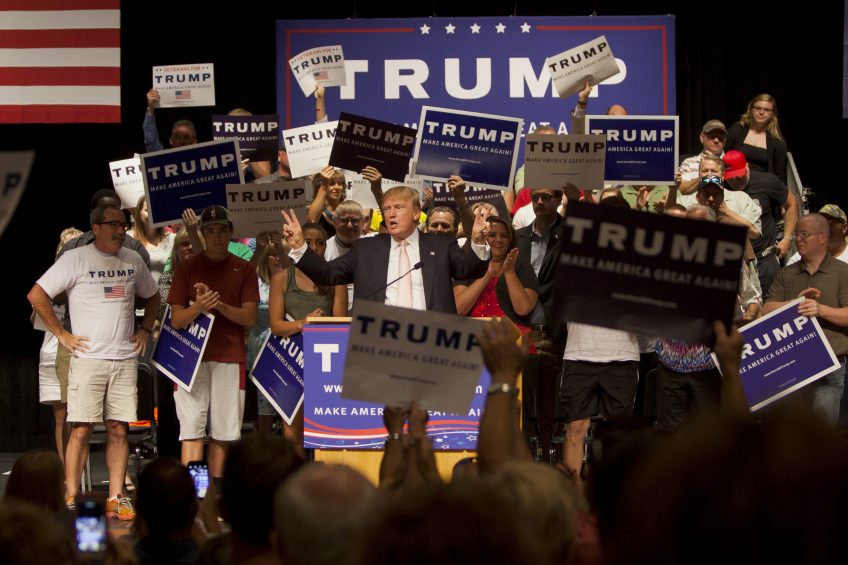What does president Trump mean for the pig industry?

For just over a week, the United States has had a new president. Out went the Democrat Barack Obama, in came Donald Trump on behalf of the Republican party. When looked at from a pig perspective, what might happen? Pig Progress editor Vincent ter Beek tried to find out.
Since I have worked in the international pig industry, I have always looked with above average interest at Iowa to see how the number 1 pig state had voted. For the last 4 elections, Iowa voted for the winning candidate.
In 2004 the state favoured the Republican candidate Bush, in 2008 and 2012 the Democrat Obama and in 2016 Iowa moved back to the Republicans, backing Mr Trump with 51% of the votes, leaving the Democrats with just under 42%.
Iowa voting Republican
If the outcome of Iowa’s vote were dependent on the state’s pork producers, I’m not surprised that Iowa voted Republican late 2016. There had been quite some animosity in the messages that reached me from e.g. the US National Pork Producers Council (NPPC) against some of the recent Obama administration’s decrees.
I read relief in the NPPC messages reaching my inbox about president-elect Trump. In a personal note to Pig Progress, just before the inauguration, NPPC president John Weber confirmed optimism, saying, “We believe the Trump administration will be good for American agriculture, good for the US pork industry and good for the country.”
Burdensome, non-science-based regulation
Mr Weber said, “On the domestic front, NPPC is very excited that among president Trump’s priorities are cutting burdensome, non-science-based regulations and reforming the tax code, because we know those actions will make the United States and America’s pork producers more competitive.”
He also touched on the international trade. “Internationally, exports are critically important to our producers; we are very dependent on exports to nations such as Canada, China, Japan and Mexico. So we support the Trans-Pacific Partnership (TPP) and urge the administration to fix and improve areas outside of pork market access where concerns have been raised. Additionally, our producers have benefitted tremendously from the NAFTA, but we are open to modernising that agreement.”
International trade and the pig business
Indeed, international trade did get attention during the first week of Trump’s presidency. On the first full working day, the new president, convinced that more international trade occurs at the expense of the domestic employment rate, signed a memorandum to withdraw the USA from the TPP. This means that the tariff-cutting partnership, which included countries dependent on pork imports, like e.g. Japan and China, but also the US’ direct neighbours Canada and Mexico, cannot be ratified.
No wonder then, that the NPPC released a statement the day after that news, emphasising to preserve tariff-free market access for US pork exports to Canada and Mexico.
Trade barriers and pork trade
A continued existence of trade barriers may not affect US pork trade that much after all, said Drew Ryder, CEO and owner of FeedLogic. He told Pig Progress: “The demand right now is primarily coming from China where pricing is still very good and there are no big moves to increase the number of sows. So even with trade barriers, pricing may still be beneficial for North American producers.”
A similar comment could be made for the grain trade, Ryder added. He said, “US crop producers have access to some of the most fertile land in the world and the latest in plant genetics and precision application technology. It will be hard for other countries to compete with this, even with trade barriers in place. If corn exports are restricted, it will be beneficial to pork producers because already-low feed prices will go even lower.”
Promoting jobs throughout the United States
So despite the withdrawal from TPP, from a business perspective the US pig industry is optimistic about Mr Trump. And why not, in his inauguration speech, Mr Trump clearly indicated that US employment is one of his main concerns. With his proposal to have Mr Sonny Perdue appointed as agriculture secretary, he has acted in line with that – as he has a history of promoting business.
What I am missing in all projections about the Trump presidency is that working with pigs is more than just buying and selling. It’s also about issues like welfare, health and environment. As our regular welfare expert Dr Monique Pairis-Garcia already indicated, most welfare-related developments in the United States are driven by market demand and had little to no legislative backing and perhaps that is a blessing in disguise.
Whatever welfare developments were going on, they had nothing to do with the Obama administration, and here the clock perhaps can’t be turned back that quickly.
Environment? Antibiotics?
My major concern is what Mr Trump will do with the areas where central authorities did have some influence. What will happen to the Clean Water Act? Will the Food and Drug Administration (FDA) issue new guidances with regard to the usage of antibiotics?
Mr Trump’s opinions on climate change as well as his proposal to e.g. appoint climate change sceptics like Mr Scott Pruitt (Environmental Protection Agency – EPA) and former ExxonMobil chairman Rex Tillerson (secretary of state) reveal that perhaps for those who concerned about other issues than money, it can’t be 2020 soon enough.
I look forward to seeing where Iowa stands in November of that year.











